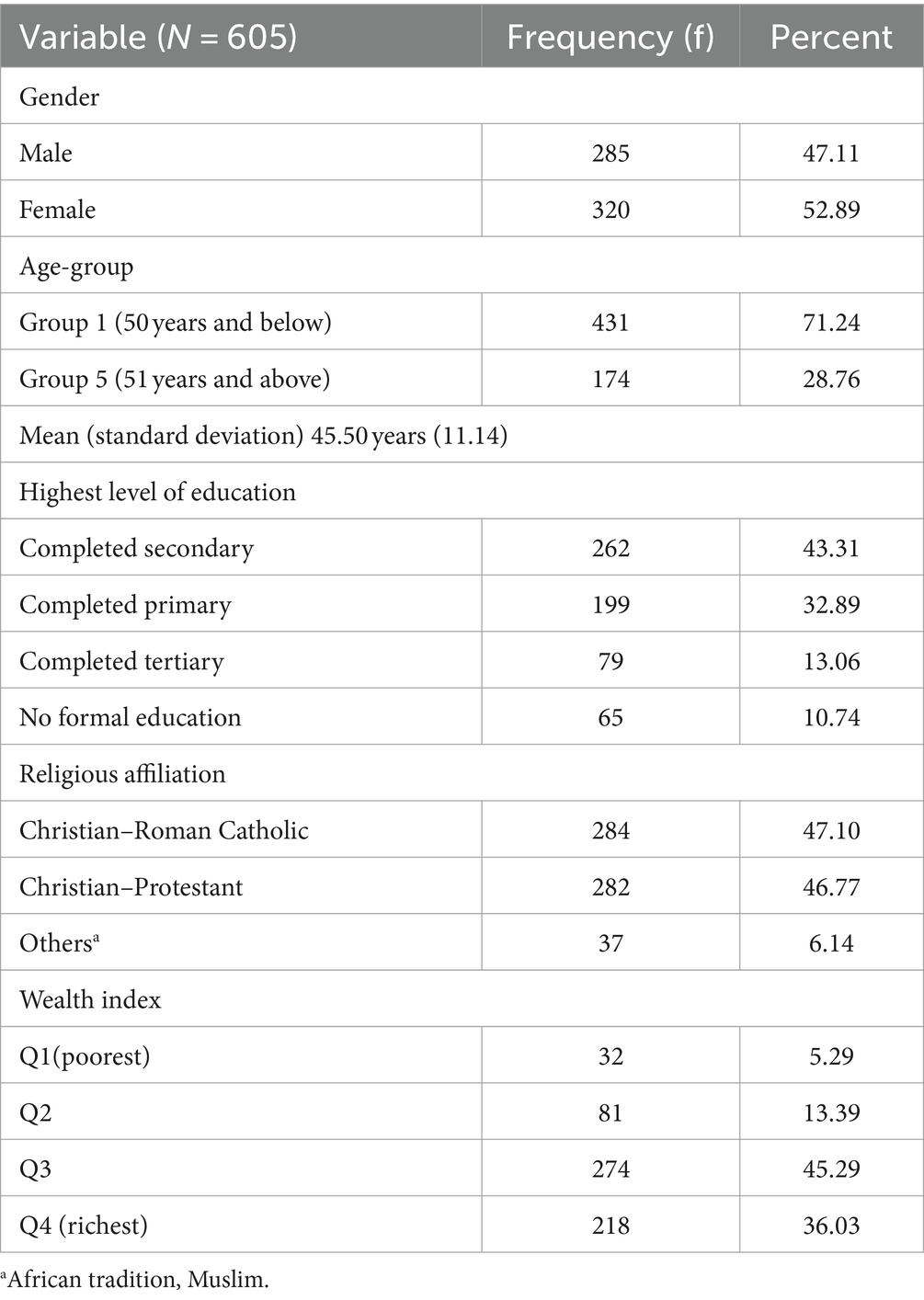- 1Health Policy Research Group, University of Nigeria, Enugu Campus, Enugu, Nigeria
- 2Department of Community Medicine, Alex Ekwueme Federal University Teaching Hospital, Abakaliki, Abakaliki, Nigeria
Introduction: Gender-transformative approaches (GTAs) have been successfully carried out to address harmful gender norms and power imbalances to promote more gender equitability. However, to improve the health and wellbeing of young people, it is necessary to involve household heads by positively transforming their beliefs on gender equity and norms.
Methods: This study was cross-sectional quantitative research undertaken in six local government areas in Ebonyi State, Nigeria. The study population consisted of household heads in households with young people aged 15–24 years. Data were collected for 15 days using paper and electronic copies of the questionnaire. Descriptive, bivariate, and logistic regression analyses were performed using Stata.
Results: The results showed that 46.32% of male and 62.81% of female heads of households disagreed with the statement “a good woman never questions her husband’s opinions, even if she is not sure she agrees with them.” Female heads of households aged 50 years and below with an odds ratio of 0.47 (p-value = 0.02) suggest they were 0.47 times more likely to have a positive attitude toward the rights and privileges of young girls. Male heads of households aged 50 years and below with an odds ratio of 1.05 (p-value = 0.84) suggest that they were 1.05 times more likely to have a positive attitude toward the rights and privileges of young girls.
Conclusion: This paper provides new knowledge on the gender norm attitude of male and female heads of households on the rights, privileges, and equity promotion of young boys and young girls, as well as its associated factors.
Introduction
Gender norms are rules that govern beliefs on how individuals in homes, communities, or institutions should behave (Pearse and Connell, 2015; World Health Organization, 2018; Heise et al., 2019). They shape the life prospects of an individual and have significant implications for both girls and boys. These norms begin in the family by parents and are reinforced by teachers, faith leaders, peers, and exposure to media (Patel et al., 2021).
Gender norms significantly influence the health of young people, as they face diverse expectations within both their homes and society based on their gender (Buller et al., 2016; Basu et al., 2017). These expectations start early and strongly shape their attitudes, opportunities, experiences, and behaviors with significant health consequences (Closson et al., 2023), such as child marriage, unwanted pregnancy, sexually transmitted infection, exposure to domestic violence, intimate partner violence, and depression (Blum et al., 2017).
Gender-transformative approaches (GTAs), which seek to transform harmful gender norms and power imbalances to promote more gender equitability (World Health Organization, 2011), have been successfully carried out (Stewart et al., 2021) in order to address harmful gender norms and practices (Levy et al., 2020). The benefits of successful GTA programs (Levy et al., 2020) include reductions in gender-based violence (Gupta and Sandhya, 2020) and improvements in sexual and reproductive health (SRH) outcomes such as family planning use and contraceptive use (Dagadu et al., 2022).
In Nigeria, evidence shows that gender inequality and social norms that favor men over women remain a major concern. Women are often portrayed as inherently inferior to men, leading to the establishment of rigid gender roles. This arbitrary social construction places men at the forefront, dominating economic and political spheres, while women are confined to domestic roles, primarily engaged in tasks considered menial and lacking in economic and political empowerment (Ajala, 2016).
In 2018, 13.2% of women aged 15–49 years reported that they had been subjected to physical and/or sexual violence by a current or former sexual partner (Nigeria Demographic Health Survey Report, 2018). Moreover, women of reproductive age (15–49 years) often face barriers to their SRH and rights: despite progress, in 2018, only 35.6% of women had their need for family planning satisfied with modern methods (UN Women, 2021).
To address these gender norm issues, and to improve the health and wellbeing of young people, it is necessary to understand the different beliefs of household heads about gender equity and the rights and privileges of young people.
The household is key in society and a head is usually responsible for the household but this is not necessarily the oldest member of the household and may be a male or a female. However, Nigerian household heads are usually male, with more female household heads seen in urban areas (NPC and ICF, 2019).
In developing nations such as Nigeria, there is a widely held belief that the gender of the household head exerts a significant influence on the decision-making processes within the household, including preferences for certain individuals and behaviors. This influence extends to favoring sons over daughters (Morakinyo et al., 2015; Sandström and Vikström, 2015).
Hence, household heads need to be actively engaged in interventions that positively transform negative beliefs on gender equity to improve overall SRH outcomes of adults and young people.
Gender norms are strongly internalized by young people as they grow up within their households and society at large to become men and women (Blum et al., 2017) and this represents a gap of opportunity to promote gender-equitable attitudes before such attitudes solidify, in turn contributing to adverse gender inequality in society. Most studies on household heads focus mainly on female-headed households, household heads’ choice of social amenities, and the social and economic challenges of household heads (Nwaka et al., 2016, 2020; Aryal et al., 2019).
However, there is a paucity of knowledge on the attitude of household heads toward young boys and young girls on the issue of gender norms since the household heads ultimately are responsible for the upbringing of young boys and girls.
This study aimed to assess the gender norm attitudes of male and female heads of households regarding the rights, privileges, and equity promotion of young boys and young girls and also identify factors associated with the gender norm attitudes of household heads toward young people within the household.
The study hypothesis is that socio-demographic characteristics influence the attitudes of male and female heads of households toward the rights, privileges, and equity promotion of young boys and girls, with factors such as age, education level, religious affiliation, and wealth index playing significant roles.
Method
Study population
The study population consisted of household heads in households with young people aged 15–24 years, with a mean age of 45.50 years and a standard deviation of 11.14. The household heads were selected from six communities using a modified cluster sampling procedure. Our definition of a cluster was a community governed by a traditional ruler. A sample size of 605 households, 285 male individuals, and 320 female individuals was computed using the guidelines outlined in the Demographic and Health Survey (DHS) Listing Manual 2012 (ICF International, 2012).
To obtain the 605 households, 101 households were systematically drawn on a cluster basis from each of the six purposively selected LGAs with PHCs that provide youth-friendly sexual reproductive services serving as clusters. The participants were recruited until the desired sample size was reached.
Study design and study area
This study was cross-sectional quantitative research undertaken in six local government areas (LGAs) of Ebonyi State, Nigeria. With an annual growth rate of 2.8%, Ebonyi State has an estimated total population of 4,339,136 and over 355,000 are young people aged 15–24 years (Ebonyi-National Youth Baseline Survey, 2014; Ebonyi State Government, 2023). The six LGAs with the poorest SRH outcomes among young people were purposively selected from the three senatorial zones. These LGAs have a total of 84 primary healthcare centers (PHCs) that provide youth-friendly SRH services and have been prioritized by the state government and partners for scaling up SRH interventions. A community was selected from each LGA based on the stakeholders’ recommendations.
Study tool and data collection
The data collection instrument was adapted from an annual publication on gender, chapter 5, page 17, which consists of gender norm attitude scales (Nanda, 2011). It was pre-tested in a contiguous state. Research assistants were recruited and trained for 4 days to assist with the data collection. The data were collected for 15 days using paper and electronic copies of the questionnaire. Individual matching of information in the paper and electronic copies of each questionnaire was carried out before the data were uploaded to the server.
Ethical approval
The protocol for the project leading to the result presented in this study was submitted to the Research and Ethics Committee of Ebonyi State Ministry of Health, with reference number: EBSHREC/07/03/2022-06/02/2026 and, the Health Research Ethics Committee of the University of Nigeria Teaching Hospital Enugu, with reference number: NHREC/05/01/2008B-FWA00002458-IRB00002323. Ethical approval was secured from both committees before community entry and mobilization. Written informed consent was obtained from respondents. Participation was voluntary, and confidentiality was assured.
Data analysis
In order to examine gender norms and attitudes toward the rights and privileges of men and women and promote girl equity across male and female heads of households, we performed descriptive, bivariate, and logistic regression analyses using Stata.
The regression model allowed us to further the analysis by isolating determinants of gender norms and attitudes on the rights and privileges of young men and women and promoting girl equity across male and female heads of household. Considering variations in individual demographic factors under a regression framework. However, the multivariate regression model can be specified parsimoniously in equation 1 as:
To generate an attitude score for maintaining the rights and privileges of men and women and promoting girl equity across male and female heads of households, responses were given weighted scores; “1” for a correct response and “0” for incorrect responses.
Thus, we assigned the value of ‘1’ if an individual answered, ‘do not agree’ to a negative statement or ‘agree’ to a positive statement. Also, the value of ‘0’if an individual answered, ‘agree’ to a negative statement or ‘disagree’ to a positive statement. Those who agree to a positive statement (or do not agree with the negative statements) on the rights and privileges of men and women and promoting girl equity across male and female heads of households were judged to have positive attitudes, while respondents who agreed to a negative statement (or do not agree to a positive statement) were judged to have negative attitudes. The total score was converted to a percentage score and used to categorize attitude; scores ≥50% were considered positive, whereas scores below 50% were considered negative.
Based on percentage scores, the outcome variable for individual is a dummy variable that takes the value of “1” if an individual score is ≥50% and a value of “0” if an individual score is below 50%. The attitude toward the rights and privileges of men was assessed using six variables. A total of two variables were used to assess the attitude toward the rights and privileges of women and four variables were used to assess the attitude toward promoting girl equity across male and female heads of household.
The Xi is a vector of control variables for individual i, which includes (i) gender, (ii) age group, (iii) highest level of education, (iv) marital status, (v) religious affiliation, and (vi) wealth index The logistic regression equation was equated to “1” if gender is female or “0” if gender is male. The error term, , is taken to be normally distributed. The level of statistical significance was determined by a p-value of <0.05.
The household wealth index was calculated using per capita household characteristics and asset ownership. The per capita household characteristics and asset ownership were used to classify households into socioeconomic quintiles, Q1 to Q4, where Q1 refers to the poorest households and Q4 refers to the richest households.
Results
The findings showed that the respondents were 52.89% women and 47.11% men (Table 1). The heads of households with an age group 50 years and below were 71.24%, while the heads of households with an age group 50 years and above were 28.76%, with a mean and standard deviation of 45.50 years and 11.14, respectively.
Approximately 83.51% of male heads of households significantly (p-value = 0.05) disagreed with the statement “the most important reason that sons should be more educated than daughters, is so that they can better look after their parents when they are older” (Table 2).
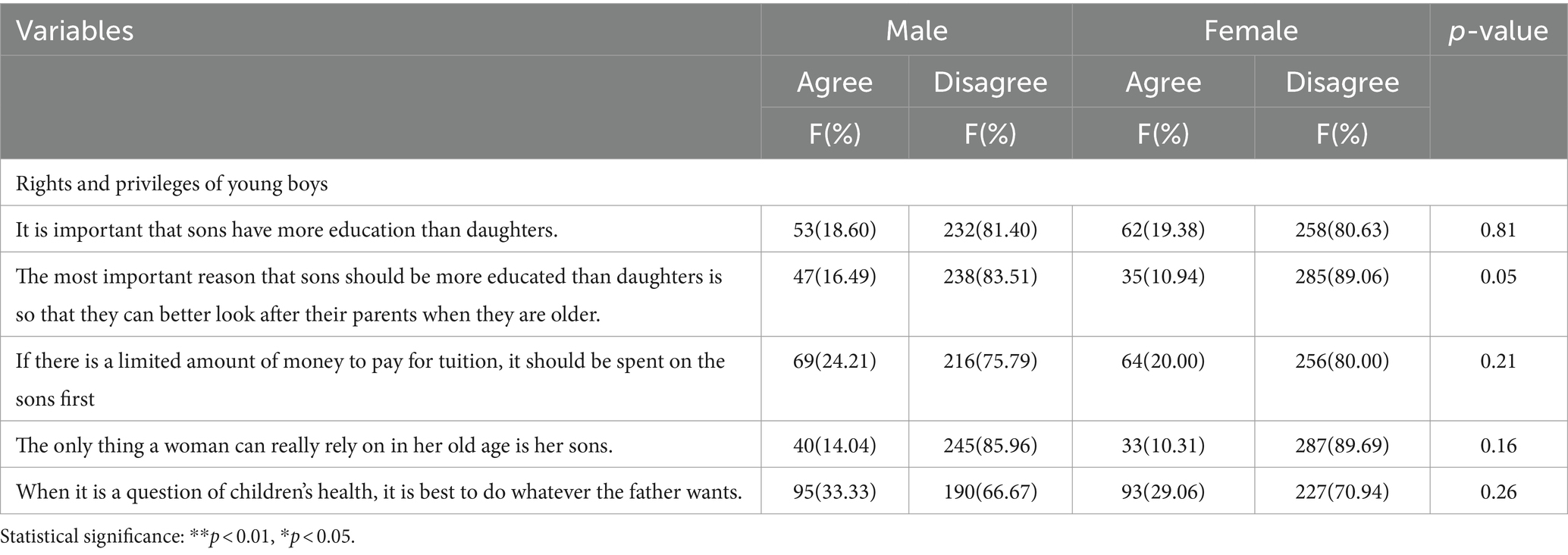
Table 2. Gender norm attitude on rights and privileges of young boys among male and female heads of households.
Approximately 62.81% of female heads of household significantly (p-value = 0.02) disagreed with the statement “A good woman never questions her husband’s opinions, even if she is not sure she agrees with them” (Table 3).
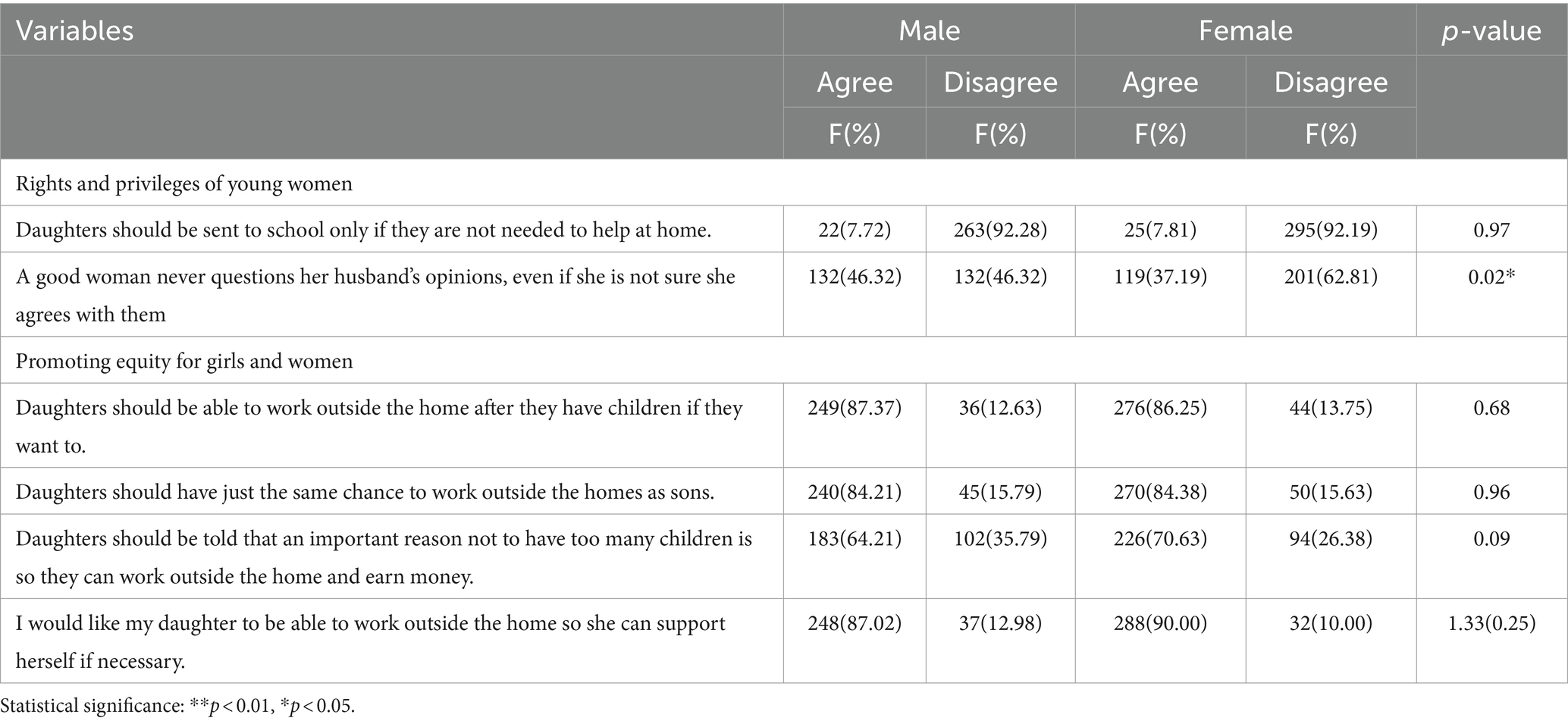
Table 3. Gender norm attitude on rights and privileges of young girls and promotion of equity for girls among male and female heads of households.
Female heads of households aged 50 years and below with an odds ratio of 0.47 (p-value = 0.02), suggest that they were 0.47 times more likely to have a positive attitude toward the rights and privileges of young girls (Table 4). Furthermore, female household heads who completed secondary education with an odds ratio of 0.41 (p-value = 0.01) indicate that they were 0.41 times more likely to have a positive attitude toward promoting girl equity.
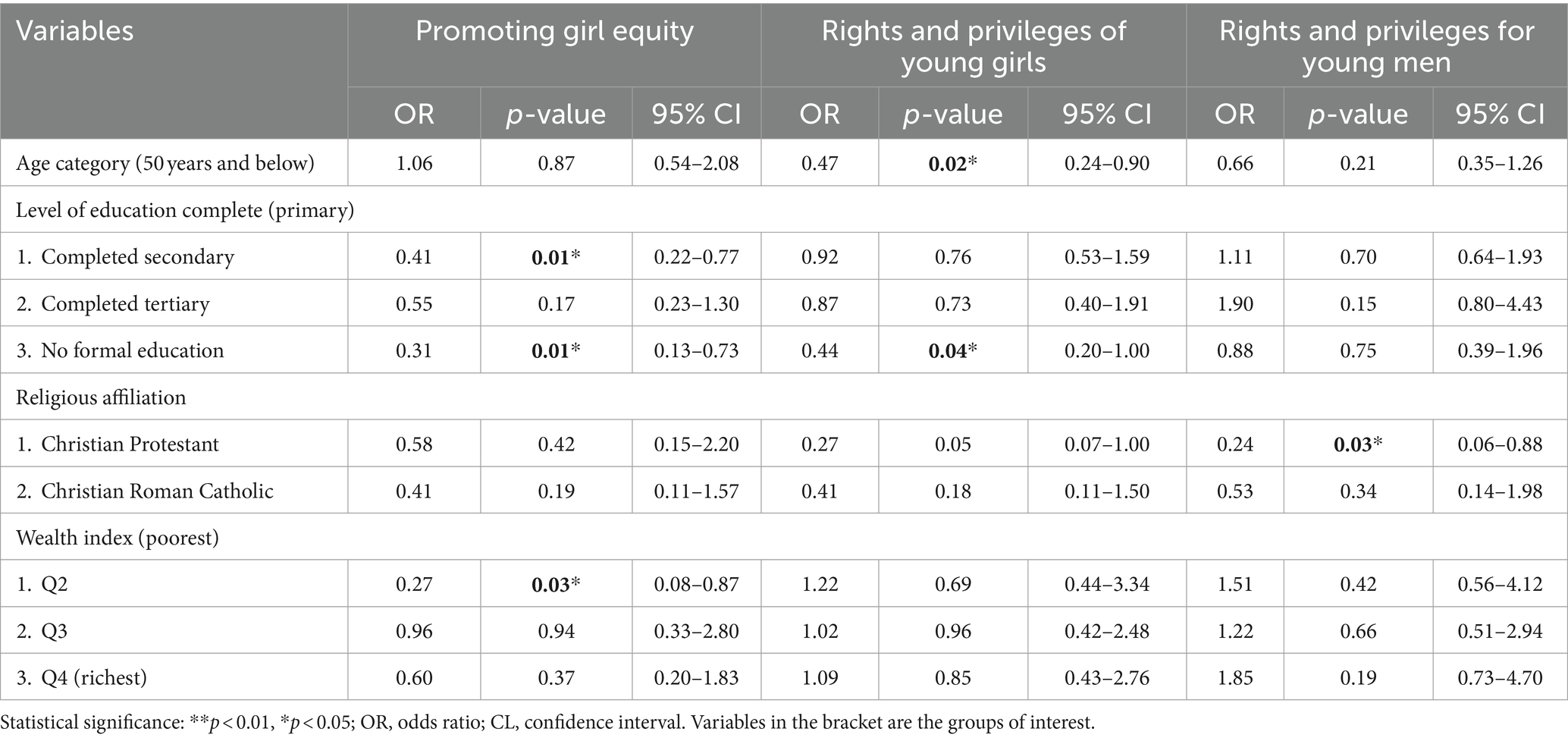
Table 4. Logistic regression of attitudes of female heads of household on rights and privileges of young people and promoting girl equity.
The finding shows that male heads of households who are Christian Roman Catholic with an odds ratio (0.20 p-value = 0.04) are 0.20 times more likely to have a positive attitude toward promoting girl equity (Table 5).
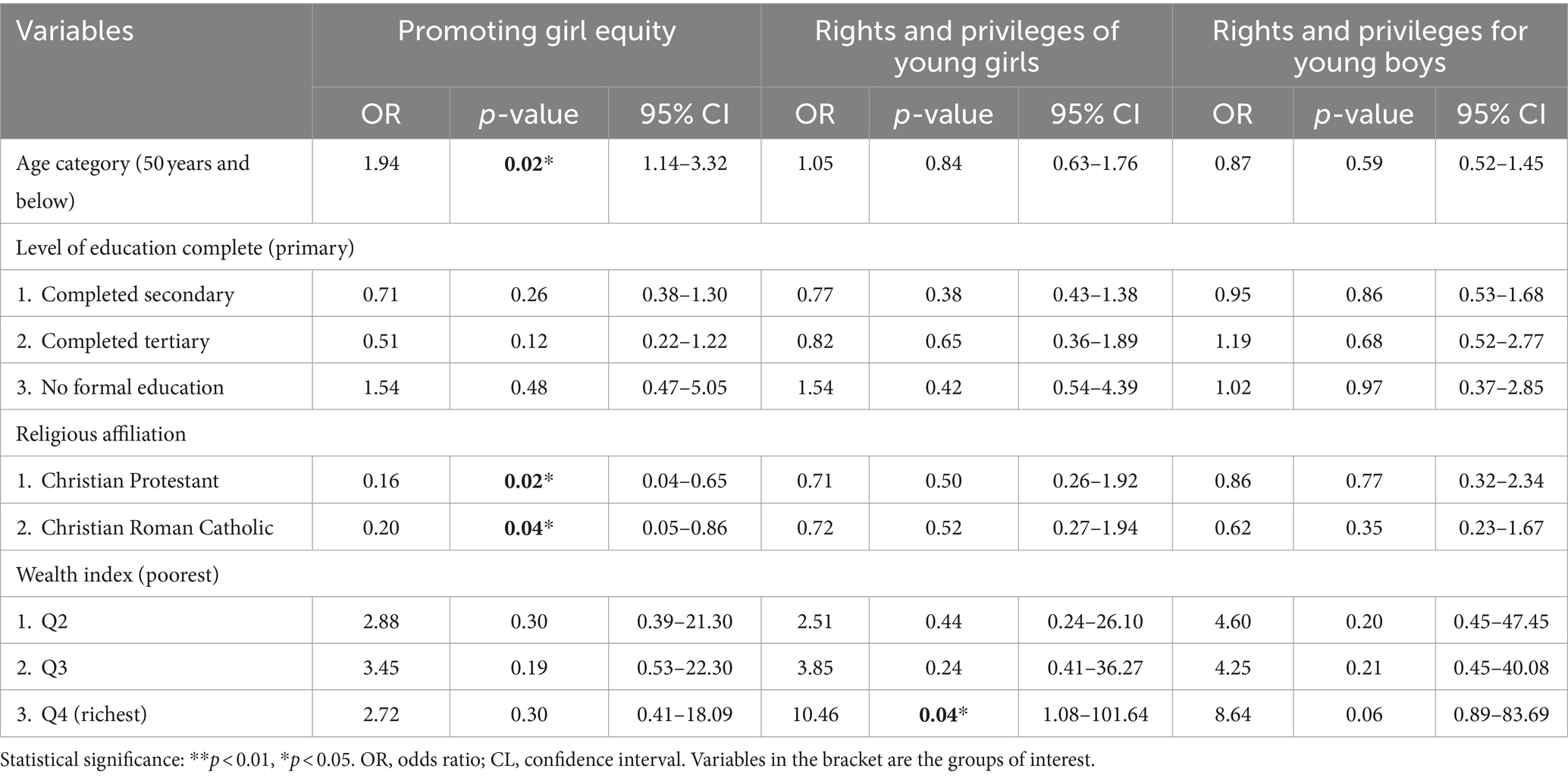
Table 5. Logistic regression of attitudes of male heads of household on rights and privileges of young people and promoting girl equity.
Discussion
This study utilized a quantitative research method to assess gender differences in attitudes of heads of households on the rights and privileges of young people and promote girl equity as well. Issues on promoting girl equity, age, and religious affiliation were factors associated with attitudes of male heads of household, while education and wealth index were factors associated with attitudes of female heads of household. Our findings highlight that gender norm attitudes are affected by different factors among male household heads and female ones.
The gender-equitable attitudes seen among female household heads toward the gender norm “that a good woman never questions her husband’s opinions, even if she is not sure she agrees with him” could be influenced by their level of education and career aspiration, as a study carried out on adolescent girls (AGs) revealed that AGs who disagreed with their family member’s belief “that a wife should always obey her husband” were those who had positive education and career aspirations (Closson et al., 2023). In addition, a previous study found protective effects on young people’s health outcomes when a woman can make decisions alone or jointly with her partner (Singh et al., 2015). The reason is that mothers, especially those who give close attention to their children, are typically the first to identify their health outcomes/challenges (Ellis et al., 2013; Dougherty et al., 2020).
Household heads (female and male) disagreed that the most important reason that sons should be more educated than daughters is so that they can better look after their parents when they are older. However, further analysis (regression) showed that gender inequity persists among female and male household heads. Heads of households (female and male) who had formal education and those who had no formal education were more likely to have negative attitudes toward promoting girl equity.
In the context of traditional patriarchal and patriarchal systems, sons are considered to have unique value, as they inherit the family name and property and represent an economic value premium to the family and parents (Sandström and Vikström, 2015; Tilt et al., 2019). This gender norm influences the negative attitude of both educated and uneducated parents toward promoting girl equity. Studies show that parental behavior changes toward a baby as soon as their sex is known or assigned (Mesman and Groeneveld, 2018). Furthermore, boys are consistently encouraged to be strong and independent, whereas girls are seen as vulnerable, ones that should be subordinate, in need of protection, and not be exposed to society (Mesman and Groeneveld, 2018). These gender norms are internalized by parents and they act on it.
A previous study on female heads of households revealed that younger female household heads complained about the challenge of playing multiple roles (head of household and mother role), which put enormous pressure on them and threatened their physical and mental health, causing them to face physical and mental depreciation (Yoosefi Lebni et al., 2020). This physical and mental depreciation could cause one to be aggressive and display harmful gender norms toward young people. This is similar to our findings, which show that female heads of households aged 50 and below have a negative attitude about the rights and privileges of young girls compared to male household heads. Across the world, women juggle work with family and household care responsibilities, and this has a great effect on the attitude of the female head of household toward young people.
Significantly, male heads of households with the highest wealth index (richest) were 10.46 times more likely to have a positive attitude toward the rights and privileges of young girls than female household heads. In developing countries, it is believed that female-headed households are poorer with lower socioeconomic status and are more vulnerable to income shortages than male-headed households (World Bank, 2018; Nwaka et al., 2020). The reasons for this include women’s disadvantaged positions in terms of limited economic opportunities for asset ownership, the family burden associated with unpaid household work, and gender discrimination in the labor market (Nwaka et al., 2016, 2020; World Bank, 2018; Aryal et al., 2019). These reasons contribute greatly to the gender norm attitude of heads of households, in that the one with the greatest economic benefits, is also expected to have greater opportunity/exposure to positive education which in turn reports in the attitude of the individual. The common issue with gender norms is that ideologies/attitudes are passed down from parents to children, and young people growing up in these environments internalize and act on these norms (Kagesten et al., 2016; Dhar et al., 2020; Patel et al., 2021), which then adversely affect their health behaviors and SRH outcomes.
This study is not without some limitations, as there could be information bias attributable to the sensitive nature of the study. However, research assistants were trained to ensure that a conducive environment and neutral attitude with respondents were maintained. Respondents were assured of the confidentiality of the information they provided. The collection of data from a large population would enable the generalizability of the findings. Researchers could utilize a qualitative research method for an in-depth understanding of these gender norms and attitudes seen among male and female household heads.
Conclusion
Individual and household level characteristics were adversely associated with heads of household attitudes on rights, privileges, and equity promotion for young boys and young girls. The majority of male and female household heads disagreed with the statement “sons need to have a better education than daughters however, female heads of households who have completed tertiary education were less likely tto have a negative attitude toward promoting girl equity.”
There is a need for strategic gender-equitable intervention to address the attitudes of household heads on rights, privileges, and equity promotion for young people across different intersections. To determine similarities and peculiarities, researchers could undertake similar studies in other settings.
Data availability statement
The raw data supporting the conclusions of this article will be made available by the authors, without undue reservation.
Ethics statement
The studies involving humans were approved by Research and Ethics Committee of Ebonyi State Ministry of Health, with reference number: EBSHREC/07/03/2022-06/02/2026 and, the Health Research Ethics Committee of University of Nigeria Teaching Hospital Enugu, with reference number: NHREC/05/01/2008B-FWA00002458-IRB00002323. The studies were conducted in accordance with the local legislation and institutional requirements. The participants provided their written informed consent to participate in this study.
Author contributions
OPN: Writing – original draft. CNE: Writing – review & editing. IA:Writing – review & editing. COM: Writing – review & editing. OO: Writing – review & editing.
Funding
The author(s) declare financial support was received for the research, authorship, and/or publication of this article. The research that led to this manuscript’s results was funded by IDRC (IDRC grant number 109809-001). The funders did not participate in the design of the study, data collection, data analysis, interpretation of data and in writing or reviewing the manuscript. The views in this manuscript do not necessarily represent the views of the funders.
Conflict of interest
The authors declare that the research was conducted in the absence of any commercial or financial relationships that could be construed as a potential conflict of interest.
The author(s) declared that they were an editorial board member of Frontiers, at the time of submission. This had no impact on the peer review process and the final decision.
Publisher’s note
All claims expressed in this article are solely those of the authors and do not necessarily represent those of their affiliated organizations, or those of the publisher, the editors and the reviewers. Any product that may be evaluated in this article, or claim that may be made by its manufacturer, is not guaranteed or endorsed by the publisher.
References
Ajala, T. (2016). Social construction of gender roles and Women’s poverty in African societies: the case of the Nigerian woman. Int. J. Gend. Women. Stud. 4. doi: 10.15640/ijgws.v4n2a1
Aryal, J. P., Mottaleb, K. A., and Ali, A. (2019). Gender and household energy choice using exogenous switching treatment regression: evidence from Bhutan. Environ. Dev. 30, 61–75. doi: 10.1016/j.envdev.2019.04.003
Basu, S., Zuo, X., Lou, C., Acharya, R., and Lundgren, R. (2017). Learning to be gendered: gender socialization in early adolescence among urban poor in Delhi, India, and Shanghai, China. J. Adolesc. Health 61, S24–S29. doi: 10.1016/j.jadohealth.2017.03.012
Blum, R. W., Mmari, K., and Moreau, C. (2017). It begins at 10: how gender expectations shape early adolescence around the world. J. Adolesc. Health 61, S3–S4. doi: 10.1016/j.jadohealth.2017.07.009
Buller, A. M., Hidrobo, M., Peterman, A., and Heise, L. (2016). The way to a man’s heart is through his stomach?: a mixed methods study on causal mechanisms through which cash and in-kind food transfers decreased intimate partner violence. BMC Public Health 16, 488–413. doi: 10.1186/s12889-016-3129-3
Closson, K., Prakash, R., Javalkar, P., Beattie, T., Thalinja, R., Collumbien, M., et al. (2023). Adolescent girls and their family members’ attitudes around gendered power inequity and associations with future aspirations in Karnataka, India. Violence Against Women 29, 836–859. doi: 10.1177/10778012221097142
Dagadu, N. A., Barker, K. M., Okello, S. B. T., Kerner, B., Simon, C., Nabembezi, D., et al. (2022). Fostering gender equality and reproductive and sexual health among adolescents: results from a quasi-experimental study in northern Uganda. BMJ Open 12:e053203. doi: 10.1136/bmjopen-2021-053203
Dhar, D., Jain, T., and Jayachandran, S. (2020). Reshaping adolescents’ gender attitudes: evidence from a school-based experiment in India. Am. Econ. Rev. 112, 899–927. doi: 10.1257/aer.20201112
Dougherty, L., Gilroy, K., Olayemi, A., Ogesanmola, O., Ogaga, F., Nweze, C., et al. (2020). Understanding factors influencing care seeking for sick children in Ebonyi and Kogi states, Nigeria. BMC Public Health 20:746. doi: 10.1186/s12889-020-08536-5
Ebonyi State Government (2023). Population figure. Ebonyi State Goverment. Available at: https://www.ebonyistate.gov.ng/profile.html
Ebonyi-National Youth Baseline Survey . (2014). National Youth Baseline Survey Nigeria Data Portal (opendataforafrica.org). Available at: https://nigeria.opendataforafrica.org/efduknf/national-youthbaselinesurvey?indicator=1000310&states=1000120-ebonyi
Ellis, A. A., Doumbia, S., Traoré, S., Dalglish, S. L., and Winch, P. J. (2013). Household roles and care-seeking behaviors in response to severe childhood illness in Mali. J. Biosoc. Sci. 45, 743–759. doi: 10.1017/S0021932013000163
Gupta, A. K., and Sandhya, K. (2020). Promoting gender egalitarian norms and practices among boys in rural India: the relative effect of intervening in early and late adolescence. J. Adolesc. Health 66, 157–165. doi: 10.1016/j.jadohealth.2019.03.007
Heise, L. , Greene, ME., Opper, N., Stavropoulou, M., Harper, C., Nascimento, M., and Zewdie, D. (2019). Gender inequality and restrictive gender norms: framing the challenges to health. Lancet, 393,2440–2454. doi:doi: 10.1016/S0140-6736(19)30652-X
ICF International . (2012). Sampling and household listing manual. Demographic and Health Surveys Methodology. Available at: https://dhsprogram.com/publications/publication-dhsm4-dhs-questionnaires-and-manuals.cfm
Kagesten, A., Gibbs, S., Blum, R. W., Moreau, C., Chandra-Mouli, V., and Herbert, A. (2016). Understanding factors that shape gender attitudes in early adolescence globally: A mixed-methods systematic review. PLoS One 11:e0157805. doi: 10.1371/journal.pone.0157805
Levy, J. K., Darmstadt, G. L., Ashby, C., Quandt, M., Halsey, E., Nagar, A., et al. (2020). Characteristics of successful programs targeting gender inequality and restrictive gender norms for the health and wellbeing of children, adolescents, and young adults: a systematic review. Lancet Global Health 8, e225–e236. doi: 10.1016/S2214-109X(19)30495-4
Mesman, J., and Groeneveld, M. G. (2018). Gendered parenting in early childhood: subtle but unmistakable if you know where to look. Child Dev. Perspect. 12, 22–27. doi: 10.1111/cdep.12250
Morakinyo, O. M., Adebowale, S. A., and Oloruntoba, E. O. (2015). Wealth status and sex differential of household head: implication for source of drinking water in Nigeria. Arch. Public Health 73:58. doi: 10.1186/s13690-015-0105-9
Nigeria Demographic Health Survey Report (2018). Available at: https://dhsprogram.com/pubs/pdf/FR359/FR359.pdf
NPC and ICF . (2019). DHS Program ICF. Rockville, Maryland, USA [Internet]; p. 748. Available at: https://dhsprogram.com/publications/publication-fr359-dhs-final-reports.cfm
Nwaka, I. D., Guven-Lisaniler, F., and Tuna, G. (2016). Gender wage differences in Nigerian self and paid employment: do marriage and children matter? Econ. Labour Relat. Rev. 27, 490–510. doi: 10.1177/1035304616677655
Nwaka, I. D., Saint Akadiri, S., and Uma, K. E. (2020). Gender of the family head and food insecurity in urban and rural Nigeria. Afr. J. Econ. Manag. Stud. 11, 381–402. doi: 10.1108/AJEMS-03-2019-0117
Patel, S. K., Santhya, K. G., and Haberland, N. (2021). What shapes gender attitudes among adolescent girls and boys? Evidence from the UDAYA longitudinal study in India. PLoS One 16:e0248766. doi: 10.1371/journal.pone.0248766
Pearse, R., and Connell, R. (2015). Gender norms and the economy: insights from social research. Fem. Econ. 22, 30–53. doi: 10.1080/13545701.2015.1078485
Sandström, G., and Vikström, L. (2015). Sex preference for children in German villages during the fertility transition. Popul. Stud. 69, 57–71. doi: 10.1080/00324728.2014.994667
Singh, K., Bloom, S., and Brodish, P. (2015). Gender equality as a means to improve maternal and child health in Africa. Health Care Women Int. 36, 57–69. doi: 10.1080/07399332.2013.824971
Stewart, R., Wright, B., Smith, L., Roberts, S., and Russell, N. (2021). Gendered stereotypes and norms: A systematic review of interventions designed to shift attitudes and behavior. Heliyon 7:e06660. doi: 10.1016/j.heliyon.2021.e06660
Tilt, B., Li, X., and Schmitt, E. A. (2019). Fertility trends, sex ratios, and son preference among Han and minority households in rural China. Asian Anthropol. 18, 110–128. doi: 10.1080/1683478X.2019.1588199
UN Women (2021). Women count Nigeria. Available at: https://data.unwomen.org/country/nigeria
World Bank . (2018). Population. Total Nigeria Available at: https://data.worldbank.org/indicator/SP.POP.TOTL?locations¼NG (Accessed May 12, 2020)
World Health Organization . (2011). Gender mainstreaming for health managers: A practical approach. Available at: https://www.who.int/publications/i/item/9789241501057 (Accessed February 3, 2022)
World Health Organization . (2018). Gender, equity, and human rights: glossary of terms and tools. Available at: https://www.who.int/gender-equity-rights/knowledge/glossary/en (Accessed December 3, 2018)
Keywords: gender equity, female household heads, male household heads, Nigeria, young people, rights, sexual and reproductive health
Citation: Nwankpa OP, Ekwueme CN, Akamike I, Mbachu CO and Onwujekwe O (2024) Do male and female heads of households have different beliefs about gender equity among young people in Nigeria? Front. Sociol. 9:1354991. doi: 10.3389/fsoc.2024.1354991
Edited by:
Alba García-Cid, University of Deusto, SpainReviewed by:
Iván Ruiz-Rodríguez, University of Malaga, SpainEugenia Allotey, University of Deusto, Spain
Copyright © 2024 Nwankpa, Ekwueme, Akamike, Mbachu and Onwujekwe. This is an open-access article distributed under the terms of the Creative Commons Attribution License (CC BY). The use, distribution or reproduction in other forums is permitted, provided the original author(s) and the copyright owner(s) are credited and that the original publication in this journal is cited, in accordance with accepted academic practice. No use, distribution or reproduction is permitted which does not comply with these terms.
*Correspondence: Ozioma Patricia Nwankpa, b3ppb21hLmFndS4yMDExODNAdW5uLmVkdS5uZw==
 Ozioma Patricia Nwankpa
Ozioma Patricia Nwankpa Chinazom N. Ekwueme
Chinazom N. Ekwueme Ifeyinwa Akamike
Ifeyinwa Akamike Chinyere Ojiugo Mbachu
Chinyere Ojiugo Mbachu Obinna Onwujekwe
Obinna Onwujekwe